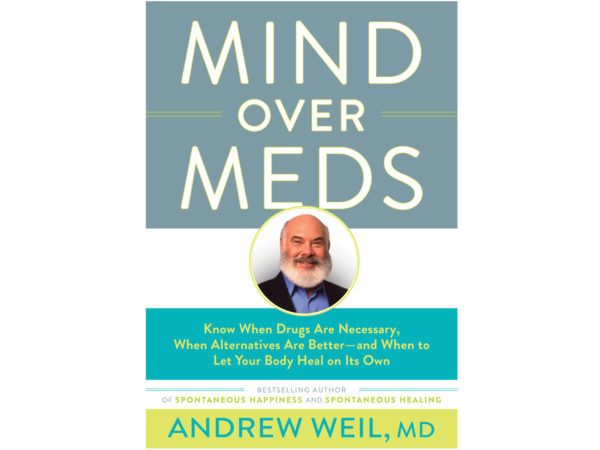Too Many Meds: The Problem And The Solution

Mind Over Meds: Know When Drugs Are Necessary, When Alternatives Are Better – And When To Let Your Body Heal On Its Own
An excerpt from Dr. Weil’s latest book:
We have a problem. More people are taking more medications than ever before and that is cause for concern. Use of prescription drugs has skyrocketed since the middle of the last century: Americans now take ten times as many as they did in the 1950s. About half of us are now taking at least one, an increase of over 20 percent just since 1994. Use of over-the-counter (OTC) medications has exploded just as dramatically. And more of us than ever are consuming dietary supplements, herbal remedies, and other products promoted for their health benefits, even though scientific evidence is often lacking for the safety and efficacy of many of them.
How many medications do you take? How about your parents? Your children? Your friends? Do you know what they’re for? How they work? What their benefits and risks are? How they might interact – with one another and with other products you may be taking? Whether there are alternatives to drugs to manage the health conditions you or your loved ones might have?
Too often, drugs fail to correct the problems they are meant to solve or simply reduce symptoms without addressing the root cause of disease. Too often, they are seen as quick and easy fixes for conditions that would be better addressed by changing dietary patterns, increasing physical activity, correcting sleep disturbances, and practicing techniques to neutralize the damaging effects of stress. At best, the benefits of many of the most widely used medications fall far short of the claims made my manufacturers, who also downplay their risks. At worst, many of those medications do more harm than good.
“All doctors do is give you pills,” is a complaint I hear from many patients. More and more doctors tell me they are not comfortable with this. One recently told me she was “tired of being a pill pusher.” Another, a psychiatrist, said he was dismayed that most psychiatric patients see a physician only four times a year – at a fifteen-minute appointment for adjustment of their medications.
It is my role as director of the University of Arizona Center for Integrative Medicine I have taught hundreds of physicians, allied health professionals, medical residents, and students about the benefits and risks of drugs. One question I always ask is “How did we come to believe that medication is the only or the most effective way to treat disease?” Medicine and medication both derive from an ancient Indo-Iranian root meaning something like “thoughtful action to establish order”; the same root gives us the words measure and meditate. How curious that “thoughtful action” has become synonymous with the giving and taking of chemical substances.
Drugs are powerful. Some are miraculously effective – like opium and its derivatives for pain and antibiotics for bacterial infections that commonly killed throughout most of human history. The discovery of insulin saved many people with type 1 diabetes from an early death. Chemotherapy agents have cured forms of leukemia and lymphoma that had always been fatal. Antiviral drugs have turned HIV infection from a death sentence into a manageable chronic illness. No responsible physician today would reject medication as a method of treating disease and maintaining health.
But it is one method only. Many other interventions exist that do not involve drugs; sadly, they are not taught in conventional medical schools, and that is one reason that most doctors rely on medication. One example is dietary change. When I write a treatment plan for a patient, my first recommendations always concern diet: what not to eat, what to eat more of, how to change eating habits to improve health. As a primary treatment strategy, dietary change can be remarkably effective. Following an anti-inflammatory diet can so improve arthritis, allergies, and other conditions that medication can be reduced and in some cases eliminated. Much evidence links the Mediterranean diet with good health, longevity, and low risk of disease. The DASH diet is an effective intervention for lowering high blood pressure (DASH is an acronym for dietary approaches to stop hypertension). Eliminating cow’s milk products from the diet often leads to marked improvement of recurrent ear infections in children and chronic sinusitis in adults. Eating whole soy foods regularly, beginning early in life, offers significant protection against hormonally driven cancers – breast cancer in women and prostate cancer in men. But because doctors are not trained in nutritional medicine, most of them are unable to give this sort of advice. Instead they rely on drugs.









